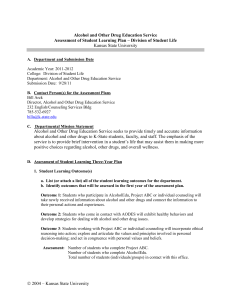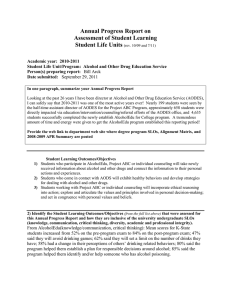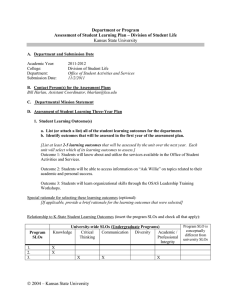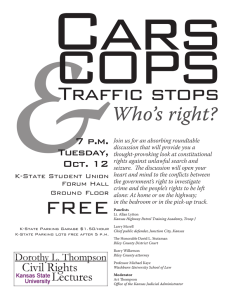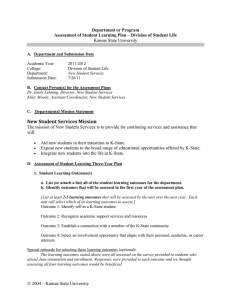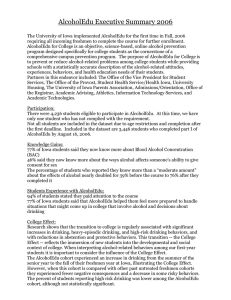Alcohol and Other Drug Education Service
advertisement
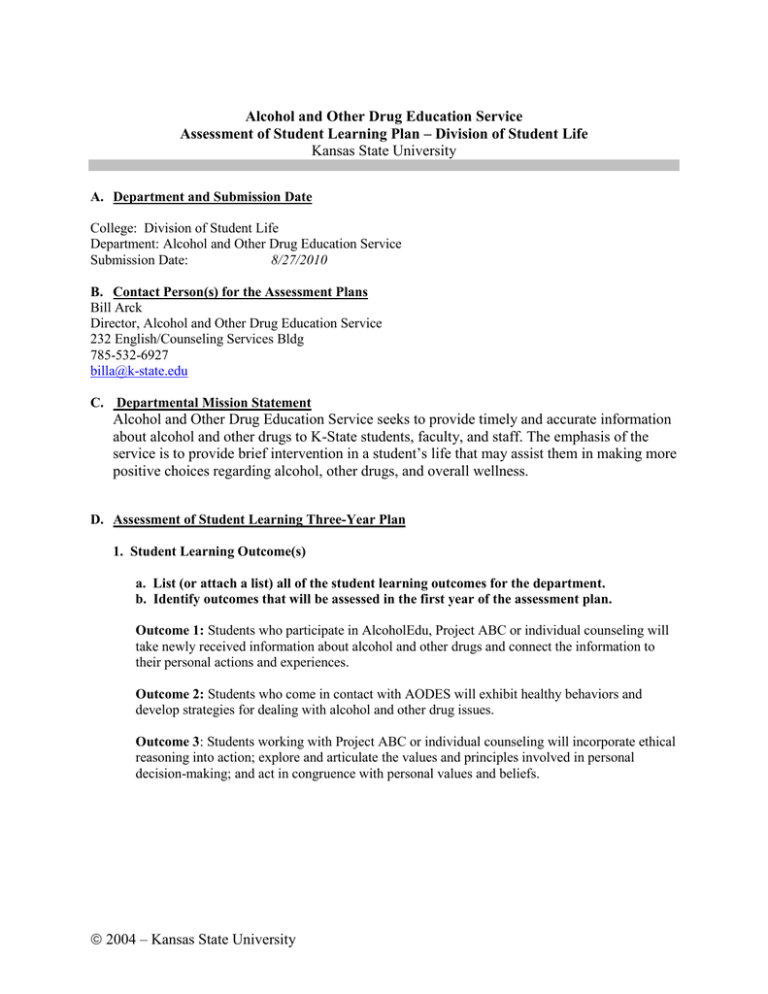
Alcohol and Other Drug Education Service Assessment of Student Learning Plan – Division of Student Life Kansas State University A. Department and Submission Date College: Division of Student Life Department: Alcohol and Other Drug Education Service Submission Date: 8/27/2010 B. Contact Person(s) for the Assessment Plans Bill Arck Director, Alcohol and Other Drug Education Service 232 English/Counseling Services Bldg 785-532-6927 billa@k-state.edu C. Departmental Mission Statement Alcohol and Other Drug Education Service seeks to provide timely and accurate information about alcohol and other drugs to K-State students, faculty, and staff. The emphasis of the service is to provide brief intervention in a student’s life that may assist them in making more positive choices regarding alcohol, other drugs, and overall wellness. D. Assessment of Student Learning Three-Year Plan 1. Student Learning Outcome(s) a. List (or attach a list) all of the student learning outcomes for the department. b. Identify outcomes that will be assessed in the first year of the assessment plan. Outcome 1: Students who participate in AlcoholEdu, Project ABC or individual counseling will take newly received information about alcohol and other drugs and connect the information to their personal actions and experiences. Outcome 2: Students who come in contact with AODES will exhibit healthy behaviors and develop strategies for dealing with alcohol and other drug issues. Outcome 3: Students working with Project ABC or individual counseling will incorporate ethical reasoning into action; explore and articulate the values and principles involved in personal decision-making; and act in congruence with personal values and beliefs. 2004 – Kansas State University Relationship to K-State Student Learning Outcomes (insert the program SLOs and check all that apply): University-wide SLOs (Undergraduate Programs) Program SLOs 1. Students will take newly received information about alcohol and other drugs and connect the information to their personal actions and experiences. 2. Students will exhibit healthy behaviors and develop strategies for dealing with alcohol and other drug issues. 3. Students will incorporate ethical reasoning into their actions; explore and articulate the values and principles involved in personal decision making; and act in congruence with personal values and beliefs. Knowledge Critical Thinking Communication Diversity Academic / Professional Integrity Program SLO is conceptually different from university SLOs 2. How will the learning outcomes be assessed? What groups will be included in the assessment? Unlike easily measurable or qualitative results, it is very, very difficult to truly assess the impact that AODES has upon student behavior based solely on its prevention and intervention activities. Due to the sensitive and personal nature of what the students learn and discuss, the outcome will be different for each student. However, we have included the following ways to attempt to measure our effectiveness. Outcome 1: AODES will assess the level to which the students have learned and incorporated knowledge in the following ways. First, the AlcoholEdu for College program, mandated for newly enrolled students, allows students to track their own individual progress. AODES will be reviewing the results from AlcoholEdu generated statistics. AlcoholEdu includes an initial survey, and one given 45 days after students have completed Part I. As we continue the AlcoholEdu program each semester, we will be able to compare and evaluate the data sets. Other direct measures include online assessments taken by the student, such as the Healthy Behaviors Assessment, and the e-CHUG (electronic Checkup To-Go). Each 2004 – Kansas State University assessment provides personalized information to the student that is discussed with a counselor. Also, the biennial AODES alcohol and other drug student survey provides long-term measures of K-State student alcohol and drug usage levels. The purpose of this survey is to more fully understand trends and current usage our campus is facing. Outcome 2: Through Project ABC, a program sanctioned for students with on-campus alcohol and drug violations, students will create a plan to change and their progress will be monitored through individual sessions. Students who go through Project ABC will have a decreased number of problem behaviors in the residence halls as reported by residence life staff. This will be monitored by the AODES Assistant Director. Outcome 3: Outcome 3 will be assessed through reviewing data such as yearly arrests for DUIs, MIPs/MICs, and alcohol and other drug related accidents and deaths in the Manhattan area and among KState students. This information will be compared to previous years by the AODES Director. 3. When will these outcomes be assessed? When and in what format will the results of the assessment be discussed? Outcome 1: The biennial AODES student survey will be compiled and reviewed in Fall 2010 by the AODES Director. Outcome 2: Students involved in Project ABC create a program of change that will be reviewed at the students’ individual sessions over a period of several weeks with the Assistant Director of AODES. Outcome 3: Results from the data listed above are viewed at the end of each spring semester, and compared with previous semesters. The AODES team will meet and discuss the findings and further action. 4. What is the unit’s process for using assessment results to improve student learning? As we view the data, we examine our efforts to make sure they are consistent with the concerns and issues that students are facing. The information gathered improves student learning by identifying at-risk areas for students, giving us an idea of preventative, reparative, and educational measures to employ. AB AODESAssessmentPlan 12/3/2010 2004 – Kansas State University
